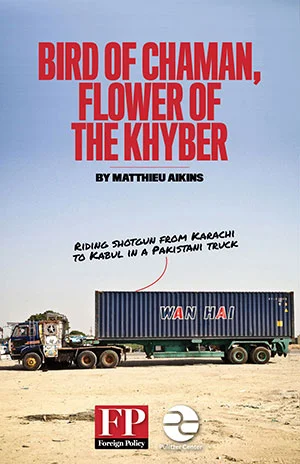Lurking behind the resentment was a gnawing concern: that one of the cops might turn on the Marines without warning. So-called green-on-blue (or insider) attacks had been sweeping Afghanistan, leaving dozens of Americans dead. Innocent frictions between the two sides in Garmsir—such as arguments over living space—now took on a more menacing tone. The Marines felt like they were walking on eggshells. "I didn't ever feel safe," Oliver said. "It was, 'Be aware, never trust them, always have your weapon on you.'" But that evening he and some of the other Marines had left their pistols on the weight rack. They were almost home free.
Aynuddin stepped into the gym and leveled his rifle.
I want to share with you one of my favorite stories that I've written in a long time, one that I think captures the heartbreak and moral ambiguity of the war as best as I have yet been able. Published in the new issue of Mother Jones, it tells the story of Lance Corporal Greg Buckley Jr., and his assassin, a teenager named Aynuddin. Last fall, I traveled through Helmand Province in southern Afghanistan, finding, among other things, Aynuddin's diary, so that he speaks to us in his own words:
As night fell, the boy went to the park to sleep. Around midnight, a pack of dogs came into the park and surrounded him. He drew his shawl tight and rolled himself inside of it. The dogs came and sniffed at him, but finally the night passed. In the morning, he was hungry, and wondered what to do.
He was tired, thirsty, and hungry. He had run away from home and was now ashamed in front of the entire world. He couldn't even ask for bread, he was too embarrassed. Filled with regret, he asked himself, why did I do this?
There is much inside the story to explain the sudden and bizarre explosion of insider attacks in Afghanistan, where Afghan police and soldiers have suddenly turned their guns on their Western allies, often at the price of their own lives, but what I think is most worthwhile about it is the simple manner in which the tragedy and absurdity of war are laid bare by the juxtaposed grief of loved ones from opposing sides.
It was on the way to Dover Air Force Base, to watch his son's body come off a plane in a box, that Buckley's anger returned. A onetime boxer, he'd always had a pugilistic streak. As Buckley and his family waited in the hangar, a tall, blond general approached and knelt in front of him. "Mr. Buckley, I just want to give you my condolences."
Buckley stabbed his fingers into the general's medals. "Do me a favor," he said, "and get the fuck up off your knee and get the fuck outta my face. 'Cause you motherfuckers had my son fucking murdered."
You can read the story here:
http://www.motherjones.com/politics/2013/10/green-on-blue-killings-afghanistan-army









